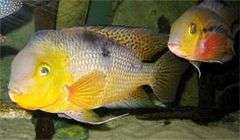Hypsophrys nicaraguensis
Hypsophrys nicaraguensis, the moga, is a species of cichlid native to the Atlantic slope of Central America, from Nicaragua to Costa Rica.[1] The species is a popular aquarium fish and is traded under a variety of common names that include nickie, parrot cichlid, macaw cichlid, butterfly cichlid and nicaraguense.[1] In Costa Rica it is known as a vieja.[2]
| Hypsophrys nicaraguensis | |
|---|---|
 | |
| Scientific classification | |
| Kingdom: | Animalia |
| Phylum: | Chordata |
| Class: | Actinopterygii |
| Order: | Cichliformes |
| Family: | Cichlidae |
| Tribe: | Heroini |
| Genus: | Hypsophrys |
| Species: | H. nicaraguensis |
| Binomial name | |
| Hypsophrys nicaraguensis (Günther, 1864) | |
| Synonyms[1] | |
Feeding
Hypsophrys nicaraguensis is able to protrude its jaw to 3.8% of its standard length limiting its diet to only 1% evasive prey.[3]
Classification
The species was formerly the only representative of its genus, and is part of family Cichlidae in subfamily Cichlasomatinae.[1] However, the Poor man's tropheus, formerly Neetroplus nematopus, has also been placed into the genus Hypsophrys, as Hypsophrys nematopus.[4]
Conservation
It occurs in the Maquenque National Wildlife Refuge.[2]
References
- Froese, Rainer and Pauly, Daniel, eds. (2018). "Hypsophrys nicaraguensis" in FishBase. June 2018 version.
- Mauricio Salas Varga (July 2008). Humedales de Ramsar (FIR) – Versión 2006-2008 (PDF) (Report) (in Spanish). Centro Científico Tropical. p. 20. Retrieved 30 August 2019.
- Hulsey, C. D.; Garcia De Leon, F. J. (2005). "Cichlid jaw mechanics: Linking morphology to feeding specialization". Functional Ecology. 19 (3): 487. doi:10.1111/j.1365-2435.2005.00987.x.
- "Convict and Jack Dempsey placed in new genera". Archived from the original on 2007-12-28. Retrieved 2008-06-27.